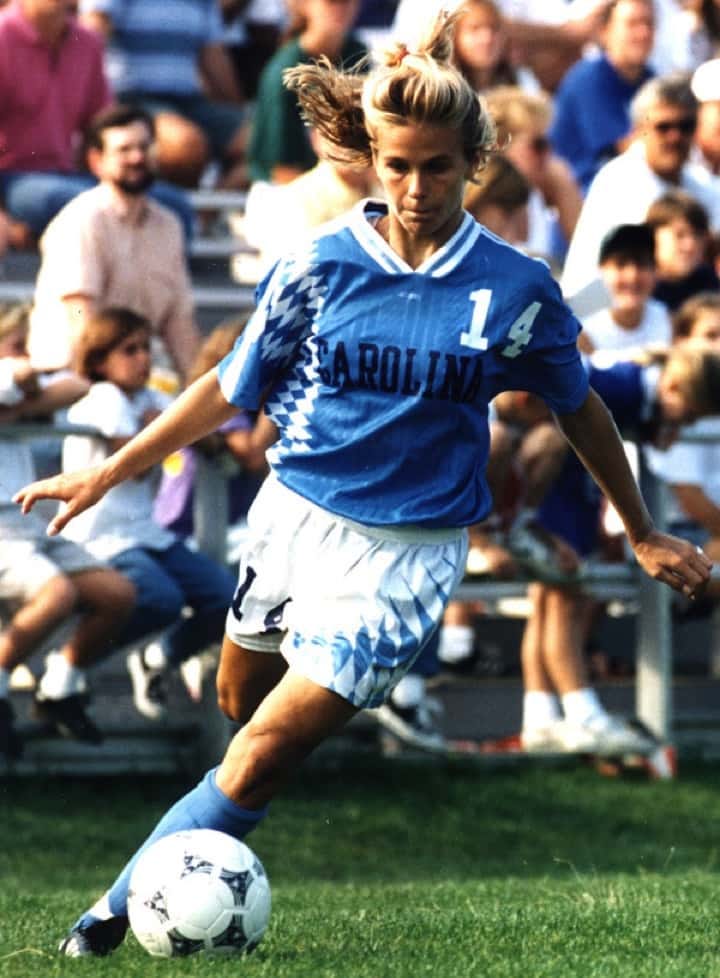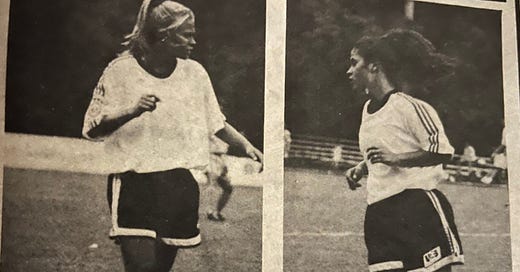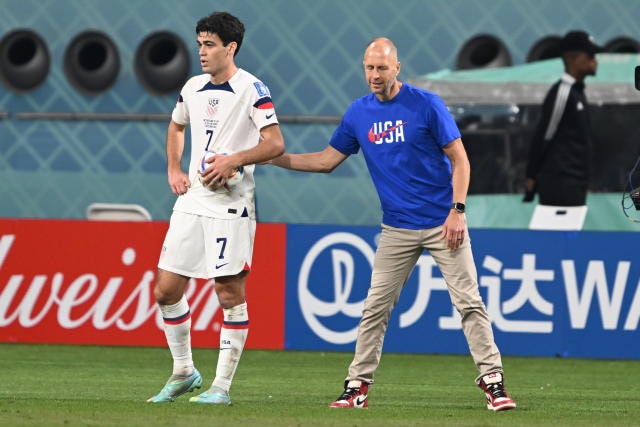Picture this: It’s 1991. You’re an elite student athlete at the University of North Carolina, playing NCAA Division I soccer alongside Mia Hamm, and the future has never looked brighter. Anything could happen! A world of possibilities awaits.
One day, your roommate (who’s also a fellow teammate) tells you she got into a fight with her boyfriend. It escalated to the point where they had to leave the bar they were at, and then he kicked her in the legs. He plays soccer at UNC too, spending hours every day training to run faster and kick harder. Legs are a soccer player’s deadliest weapon and greatest weakness. He kicked her in the legs. Anything could happen.
31 years later, he’s no longer your roommate’s boyfriend – he’s her husband and father to their four children. He grew up playing soccer in youth leagues and high school with the man you would eventually marry and your husband was the best man at his wedding. He coaches your son on the U.S. men’s national team (USMNT). Anything could happen.

How to describe the world of U.S. soccer? “Tight-knit,” if we’re feeling generous. “Exclusionary” or “incestuous” if we’re feeling less so. Practically every youth sport in the U.S. is pay-to-play, but few are characterized by such a stark imbalance between what the sport physically requires and the cost of being on a team. Unlike hockey or gymnastics, where the equipment itself can act as a barrier to entry, all you need to play soccer is space to run, a ball, and something to score in. Theoretically, at least. In practice, the sport’s infrastructure excludes a lot of kids who might have otherwise developed into stars just because they aren’t rich, white or well-connected enough. So it’s not surprising that the cast of characters we encounter at the professional level is a small one, with a decades-long history and bitter grievances to go along with it. U.S. soccer is high school as it’s portrayed in shows like Beverly Hills, 90210 and The O.C. – there are only 10 people who matter, most of their parents are obscenely wealthy, they’ve all dated each other at some point, and just because they graduated doesn’t mean they’re going to stop reliving their bygone glory days any time soon.
The closest teen TV show parallel I can think of for Gio Reyna, 20-year-old USMNT rising star, is Nathan Scott from One Tree Hill (minus the half-brother and abusive dad, as far as I know). He’s never had to worry about club dues, tournament fees, uniform costs, or the considerable time and energy it takes to simply find transportation to and from games hosted hours away from home every weekend. Like any good nepo baby, he’s more concerned with legacy and living up to expectations. As part of the first family ever to have three members selected for U.S. senior national teams, greatness is a given – for him and his fans alike. The 2022 World Cup was supposed to be his inauguration, a glorious introduction to the Age of Gio. Instead, he sat on the sidelines for two out of four games and played only 52 minutes in the remaining two before the Netherlands eliminated the U.S. from the tournament.

Online, speculation ran rampant about behind-the-scenes tension between player and coach (Gregg Berhalter). Why would Berhalter bench one of the most exciting young players on the roster, the heir apparent to the throne? Was he trying to prove he wouldn’t play favorites, not even for the benefit of his friend’s son who he watched grow up? What could possibly take precedence over increasing the chances of a U.S. win on soccer’s biggest international stage? For Americans who care about the sport (a small but growing number) and are desperate for feel-good victories, declining to use any of the advantages at our disposal just to teach players a lesson felt like a luxury we couldn’t afford.
The answers came on December 11, when comments that Berhalter made at a leadership summit about “a player” who was nearly sent home from the World Cup for poor attitude and lack of effort were published in a Charter newsletter. It was an obvious, if very thinly veiled, reference to Gio Reyna, who responded the following day in an Instagram post addressing the rumors concerning his behavior. Turns out, all that stuff about nepo babies feeling entitled to things they haven’t really earned? Not such a myth after all! Upon learning that he wouldn’t be getting as much playing time as he had anticipated, Reyna proceeded to sulk so intensely that some of the coaches and staff members allegedly voted to put His Petulancy on a direct flight back to the U.S. They said: Well it’s better for you to go home than to not have luggage, Farrah. The threat of being kicked out of Destiny’s Child must have been the wake-up call he needed, because he apologized to the team and decided to actually try despite – the horror! – being relegated to a supporting role.
Divas and their temper tantrums are a tale as old as time in men’s sports (Ronaldo is still providing fuel for this narrative fire 20 years into his career), but ultimately the only reason we know about the situation at all is because Berhalter chose to shine a light on it. Supposedly his comments at the summit were never meant to be publicized (and were “erroneously greenlit for publication by someone representing the event organizers,” according to an editor’s note added to the newsletter after the story blew up), but this is a man with ample media training who’s been dealing with the press as a professional athlete and coach since 1994. He knew there was a very good chance the information would leak. As for why he chose to dig up the issue when keeping his mouth shut would’ve let the whole thing blow over without further incident – who knows? Maybe he got tired of seeing his mentions filled with Reyna stans calling him an incompetent imbecile for not starting their fave. Maybe he has a pathological need to be right, and proving that he knew the kid wasn’t ready for the spotlight outweighed his discretion. Maybe he got in a fight with Claudio Reyna (Gio’s dad and Berhalter’s longtime friend) and wanted to get back at him by maligning his son’s reputation. Maybe he’s a fellow Normal Gossip listener and just wanted to bring us an anonymous morsel of intrigue out of the goodness of his nosey little heart. I don’t claim to know what goes on in that bald head of his, but I guarantee you it’s nothing good.
Here’s where that UNC backstory comes into play. The college athlete whose cleats I asked you to put yourself in at the top? That’s Gio Reyna’s mom, Danielle. Her roommate was Rosalind Berhalter (née Santana), and her roommate’s no-good boyfriend was – if you haven’t already guessed – Gregg Berhalter. Welcome back to another episode of U.S. soccer, where high school never dies and grudges older than your children rear their ugly heads just in time for the season finale.
Hating your friend’s boyfriend is a lifelong commitment. He can come crawling back to her with all the proof that he’s changed (he’s in counseling; he’s taking the time to truly learn who he is and what he wants; he’s ready for a real relationship now; he would never kick her in the legs again) and she may even buy it, but you know better. He’s shown you who he is, and you’re not going to forget any time soon. Even when he turns out to be a childhood friend of your husband. Even if you decide there’s no imminent danger in allowing your families to become close. Hidden behind the front of acceptance there will always be a part of you that remembers, that simmers with suspicion, that lies in wait to strike when the moment presents itself.
Berhalter talking shit about her son was the moment Danielle Reyna had been waiting for since 1991. On a call to U.S. Soccer sporting director Earnie Stewart, she and her husband informed him of Berhalter’s assault on his now-wife. In her own words (emphasis is my own):
“As part of that conversation, I told Earnie that I thought it was especially unfair that Gio, who had apologized for acting immaturely about his playing time, was still being dragged through the mud when Gregg had asked for and received forgiveness for doing something so much worse at the same age. … Rosalind Berhalter was my roommate, teammate and best friend, and I supported her through the trauma that followed. It took a long time for me to forgive and accept Gregg afterward, but I worked hard to give him grace, and ultimately made both of them and their kids a huge part of my family’s life. I would have wanted and expected him to give the same grace to Gio. ”
The U.S. Soccer federation, which has been under pressure to finally start taking allegations of abuse in the U.S. pro women’s soccer league seriously, announced earlier this week that it has hired a law firm to investigate Berhalter for his assault in 1991. Berhalter released a statement of his own on Twitter to get ahead of the story and insinuate that the intent behind this information being shared was to “take [him] down” and “bring about the end of [his] relationship with U.S. Soccer.” His contract as the U.S. coach expired on December 31, 2022 so … good luck booking that “relationship with U.S. Soccer” he speaks of.
This entire saga would be my favorite type of mess – overbearing parents, adults behaving like petty adolescents, lengthy Twitter statements in size 9 font – if not for the Rosalind of it all. To have something so private and upsetting from your past dredged up as fodder for public spectacle and memes made by 14-year-old cretins on soccer Twitter is bad enough; the fact that it was someone claiming to be your best friend who gleefully showed the vultures which scabs to pick at is insult to injury. No matter how ardently Danielle Reyna had been praying on Gregg Berhalter’s downfall, no matter how unjust she felt it was that he had never faced any real consequences for his violence, and no matter how much she wanted to protect her whiny son – it was not Danielle’s story to tell, and it was deeply disrespectful to Rosalind that she did so for her own gain.
Her statement is stunningly obtuse at every turn, from her surprise that bringing up an allegation of assault to the sporting director of U.S. Soccer might result in official action (“I thought our conversation would remain in confidence, and it didn’t occur to me at the time that anything I said could lead to an investigation. I’m not criticizing Earnie here.”) to her belated remorse for how her actions would wreak havoc on Rosalind’s life (“I’m sorry that this information became public, and I regret that I played a role in something that could reopen wounds from the past.”). I am one of the world’s foremost advocates of treating men with contempt – particularly men who have hurt my friends and could do it again. But nothing about Danielle’s choices in this situation were made with friendship in mind. They were about trying to protect her son’s precious feelings at any cost, and that included Rosalind’s trauma. So what if people think your kid has a shitty attitude? He’s a 20-year-old whose talent and privilege have allowed him to surpass most of his peers without breaking a sweat – he probably is a little bit of an asshole, if you’re being honest with yourself. And just because your college roommate’s boyfriend got to behave badly and wasn’t punished for it doesn’t mean it’s your son’s right to do so as well.

Every time I think there’s an end to the USMNT drama, some wild development occurs, so by next week this write-up might be outdated already. But that’s life, I guess. Anything could happen.




